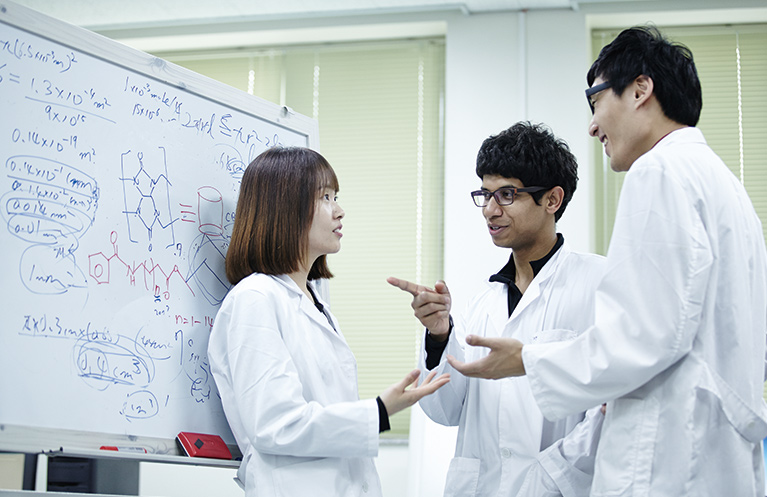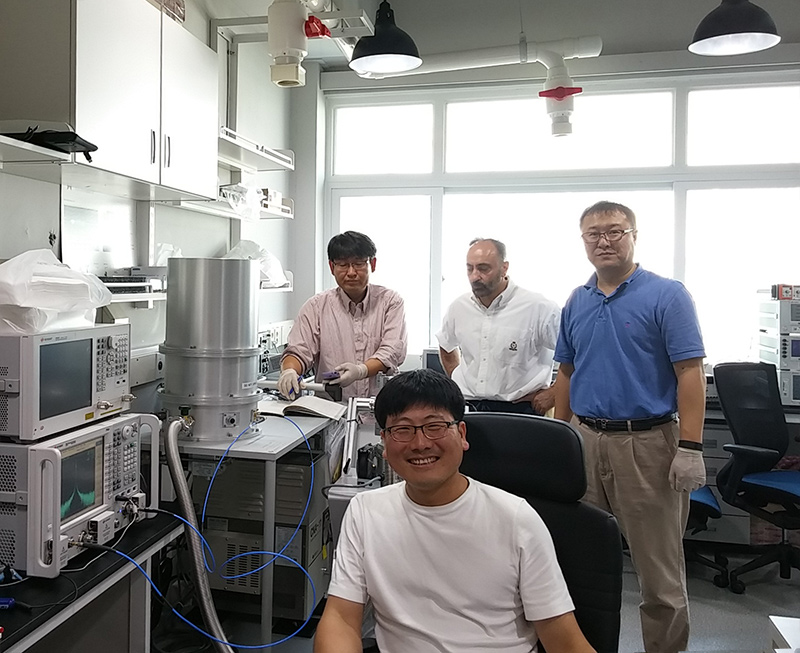주메뉴
- About IBS 연구원소개
-
Research Centers
연구단소개
- Research Outcomes
- Mathematics
- Physics
- Center for Theoretical Physics of the Universe(Particle Theory and Cosmology Group)
- Center for Theoretical Physics of the Universe(Cosmology, Gravity and Astroparticle Physics Group)
- Center for Exotic Nuclear Studies
- Center for Artificial Low Dimensional Electronic Systems
- Center for Underground Physics
- Center for Axion and Precision Physics Research
- Center for Theoretical Physics of Complex Systems
- Center for Quantum Nanoscience
- Center for Van der Waals Quantum Solids
- Chemistry
- Life Sciences
- Earth Science
- Interdisciplinary
- Center for Neuroscience Imaging Research(Neuro Technology Group)
- Center for Neuroscience Imaging Research(Cognitive and Computational Neuroscience Group)
- Center for Algorithmic and Robotized Synthesis
- Center for Genome Engineering
- Center for Nanomedicine
- Center for Biomolecular and Cellular Structure
- Center for 2D Quantum Heterostructures
- Center for Quantum Conversion Research
- Institutes
- Korea Virus Research Institute
- News Center 뉴스 센터
- Career 인재초빙
- Living in Korea IBS School-UST
- IBS School 윤리경영


주메뉴
- About IBS
-
Research Centers
- Research Outcomes
- Mathematics
- Physics
- Center for Theoretical Physics of the Universe(Particle Theory and Cosmology Group)
- Center for Theoretical Physics of the Universe(Cosmology, Gravity and Astroparticle Physics Group)
- Center for Exotic Nuclear Studies
- Center for Artificial Low Dimensional Electronic Systems
- Center for Underground Physics
- Center for Axion and Precision Physics Research
- Center for Theoretical Physics of Complex Systems
- Center for Quantum Nanoscience
- Center for Van der Waals Quantum Solids
- Chemistry
- Life Sciences
- Earth Science
- Interdisciplinary
- Center for Neuroscience Imaging Research(Neuro Technology Group)
- Center for Neuroscience Imaging Research(Cognitive and Computational Neuroscience Group)
- Center for Algorithmic and Robotized Synthesis
- Center for Genome Engineering
- Center for Nanomedicine
- Center for Biomolecular and Cellular Structure
- Center for 2D Quantum Heterostructures
- Center for Quantum Conversion Research
- Institutes
- Korea Virus Research Institute
- News Center
- Career
- Living in Korea
- IBS School
News Center
| Title | The Young Scientist Fellowship (YSF), a Stepping Stone Towards Successful Leadership | ||||
|---|---|---|---|---|---|
| Name | Department fo Communications | Registration Date | 2016-06-29 | Hits | 3220 |
| att. |
 3.JPG
3.JPG
|
||||
The Young Scientist Fellowship (YSF), a Stepping Stone Towards Successful Leadership- Online application will be open until July 31 - In celebrating the 5th anniversary of its foundation, IBS set forth an “IBS Initiative” earlier this year. It has three action plans: “Increasing opportunities for young talent”, “Building global leadership” and “Strengthening institutional identity,” which aim at making a new leap. In an effort to implement the first action plan, the 1st recruitment of the Young Scientist Fellowship (YSF) is ongoing.
Once selected, these young researchers are supported for a three-year term with a possibility of a two-year extension depending on reviews. They are granted sizable research budgets ranging from KRW 150 million to 300 million; up to an annual average of KRW 300 million for experimental fields and up to an annual average of KRW 200 million for theoretical fields. After YSF program ends, these researchers are eligible for the IBS Career Development Awards (CDA). The CDA is designed to fund post-YSF research projects to ensure the continuity of research for YSF fellows.
The YSF selection procedure is two-fold: In phase one, applicants are screened for an in-depth evaluation based on their letters of intent. In phase two, selected applicants, whose full proposals are examined, are evaluated based on their on-site interviews and presentations. “The YSF allows young researchers to pursue their full potential at IBS,” said IBS President KIM Doochul. “These young researchers will grow into future research leaders and become key researchers at major universities and research institutes across the world.” More information is available on the IBS website, www.ibs.re.kr/ysf. Letters of intent for phase one screening will be collected via email to ysf@ibs.re.kr. The closing date is July 31.
The YSF program is an upgraded version of IBS’s previous young researchers program called the Young Scientist Program (YS). Research Fellow YOUN Sung Woo, as a YS fellow is dedicating himself to the hunt for the axion, dark matter candidate at the IBS Center for Axion and Precision Physics Research(CAPP) led by Director Yannis K. SEMERTZIDIS. He spoke about his experience as a YS fellow.
1. What made you apply for the YS program?
3. What are you investigating at CAPP now?
|
|||||
| before | |
|---|---|
| before |
- Content Manager
- Public Relations Team : Yim Ji Yeob 042-878-8173
- Last Update 2023-11-28 14:20













